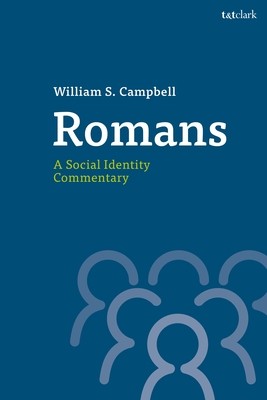
- We will send in 10–14 business days.
- Author: William S Campbell
- Publisher: T&T Clark
- ISBN-10: 0567669424
- ISBN-13: 9780567669421
- Format: 15.6 x 23.4 x 2.7 cm, kieti viršeliai
- Language: English
- SAVE -10% with code: EXTRA
Reviews
Description
William S. Campbell provides a comprehensive commentary on Paul's most challenging letter. In conversation with reception history and previous scholarship, he emphasizes the contextuality of Romans as a letter to Rome, using social identity theory combined with historical, literary and theological perspectives to arrive at a coherent reading of the entire letter. Because Paul has never visited Rome and is not the founder of the Christ-movement there, Campbell argues that his guidance and teaching are formulated more cautiously than in his other letters. Yet the long list of people who had previous links with him and his mission to the 'gentiles' demonstrates that Paul is well-informed about the situation in Rome and addresses issues that have arisen.
With Christ the Messianic Time is beginning, but there was some lack of clarity in Rome about the implications of this for Jews and gentiles. Rather than ethne in Christ replacing Israel, as some in Rome possibly concluded, Campbell stresses that Paul affirms the irrevocable calling of Israel, and that simultaneously the identity of ethne in Christ is also called alongside the people Israel; thus, the integrity of the identity of both is affirmed as indispensable for God's purpose now revealed in Christ. Campbell fully demonstrates how Paul in Romans achieves this by the social and theological intertwining of the message of the gospel.EXTRA 10 % discount with code: EXTRA
The promotion ends in 21d.04:25:31
The discount code is valid when purchasing from 10 €. Discounts do not stack.
- Author: William S Campbell
- Publisher: T&T Clark
- ISBN-10: 0567669424
- ISBN-13: 9780567669421
- Format: 15.6 x 23.4 x 2.7 cm, kieti viršeliai
- Language: English English
William S. Campbell provides a comprehensive commentary on Paul's most challenging letter. In conversation with reception history and previous scholarship, he emphasizes the contextuality of Romans as a letter to Rome, using social identity theory combined with historical, literary and theological perspectives to arrive at a coherent reading of the entire letter. Because Paul has never visited Rome and is not the founder of the Christ-movement there, Campbell argues that his guidance and teaching are formulated more cautiously than in his other letters. Yet the long list of people who had previous links with him and his mission to the 'gentiles' demonstrates that Paul is well-informed about the situation in Rome and addresses issues that have arisen.
With Christ the Messianic Time is beginning, but there was some lack of clarity in Rome about the implications of this for Jews and gentiles. Rather than ethne in Christ replacing Israel, as some in Rome possibly concluded, Campbell stresses that Paul affirms the irrevocable calling of Israel, and that simultaneously the identity of ethne in Christ is also called alongside the people Israel; thus, the integrity of the identity of both is affirmed as indispensable for God's purpose now revealed in Christ. Campbell fully demonstrates how Paul in Romans achieves this by the social and theological intertwining of the message of the gospel.

Reviews